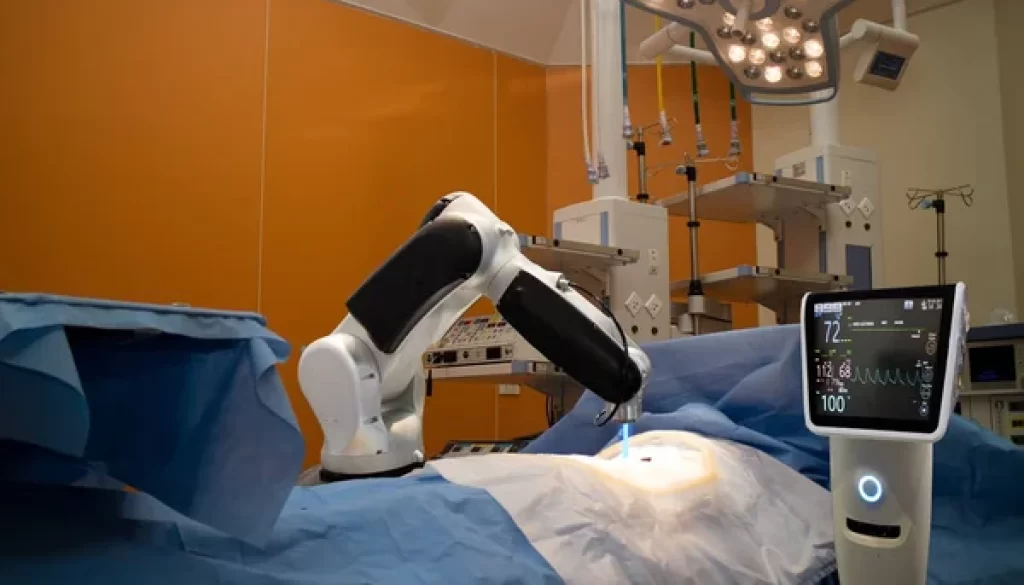The Power of Artificial Intelligence in Healthcare
The dominion of Artificial Intelligence (AI) has, in recent years, ushered in a profound transformation across a myriad of industries. However, it’s within the precincts of healthcare that AI has emerged as a formidable catalyst, ushering in pioneering solutions that elevate patient care, streamline operational processes, and amplify overall efficiency. This discourse navigates the enthralling domain of Artificial Intelligence within healthcare, delving into its latent potential, contemporary implementations, and the profound footprint it has etched in this sector. Lets uncover Artificial Intelligence in Healthcare.

Understanding AI in Healthcare
AI is the simulation of human-like cognition in machines, endowing them with the faculty to think and learn akin to humans. In the context of healthcare, AI harnesses algorithms and data to dissect and decipher intricate medical information. This transformative technology unfurls a vista of opportunities, proffering remedies hitherto considered the stuff of science fiction.
AI does not manifest as a singular entity but is a composite of diverse subfields, each wielding distinctive prowess. These subdomains encompass machine learning, natural language processing, computer vision, and robotics. In the healthcare panorama, these AI sub-spheres coalesce harmoniously to dispense holistic solutions.
Read about AI vs Human: Artificial Intelligence vs Human Intelligence: Unraveling the Advancements
Diagnostics and Disease Detection
Among the most profound inroads of AI in the healthcare sphere is its role in diagnostics and malady identification. AI-driven systems demonstrate an extraordinary aptitude to dissect medical imagery, encompassing X-rays, CT scans, and MRIs, with remarkable precision. They can pinpoint anomalies, neoplasms, and even incipient signs of ailments that might elude human observation. This not only economizes time but augments the precision of diagnoses.
The capabilities of AI in image scrutiny are rooted in deep learning, a facet of machine learning wherein artificial neural networks are schooled to execute specialized tasks. Concerning diagnostics, these neural networks are tutored on extensive archives of medical images, empowering them to discern motifs and anomalies that might slip past even the most adept radiologists.
The infusion of AI into diagnostics extends into the domain of pathology. Pathologists now receive AI-abetted insights in scrutinizing tissue specimens. This not only accelerates the process but also elevates the precision quotient, thereby curtailing the odds of erroneous diagnoses.
AI’s role in diagnostics assumes a preeminent role in the premature discernment of diseases, notably conditions such as cancer. By identifying subtle cues that might elude human scrutiny, AI paves the path for early intervention, thus potentially transmuting patient outcomes significantly.
Moreover, AI stakes a claim in the realm of ascertaining rare diseases, where precise and prompt diagnosis presents a peculiar challenge. Machine learning models can be tutored on an array of clinical data and medical illustrations to unearth models linked to these infrequent ailments, thereby aiding their identification.
Personalized Treatment Plans

AI also occupies a pivotal space in customizing curative strategies for individual patients. Through the scrutiny of a patient’s medical annals, genetic archives, and ongoing symptoms, AI propounds individualized treatment suggestions. This ensconces that patients receive the most efficacious and least invasive therapies, thus minimizing side effects and expediting convalescence.
The capability to calibrate treatment schemes via AI assumes an especially vital mantle in the sphere of oncology. Distinct cancer strains might respond differentially to treatments, and a patient’s genetic configuration can markedly sway the efficacy of a particular therapeutic regimen. AI operates as the compass guiding oncologists toward the most befitting treatment alternatives, hence heightening the prospects of favorable results.
Personalized medicine has long beckoned in the domain of healthcare, and AI is ushering us closer to the realization of this vision. By taking into cognizance an individual’s idiosyncratic attributes, AI guarantees that treatments are not characterized by a one-size-fits-all paradigm but are instead tailored to the precise exigencies of each patient.
Moreover, AI can lend a hand in the ongoing stewardship of chronic conditions. For instance, in diabetes management, AI can assess glycemic data and offer recommendations regarding insulin dosage modifications to empower patients in sustaining optimal blood sugar levels.
Read about AI Revolutionizing Industries: Revolutionizing the Artificial Intelligence Industry: A Comprehensive Overview
Drug Discovery and Development
The pharmaceutical sector has garnered substantial dividends from AI’s acumen in the exploration and maturation of medications. Conventional drug development typically spans extensive timelines and incurs prodigious costs. Yet, AI is proficient in analyzing vast databases to expedite the identification of plausible drug candidates. This not only accelerates the maturation phase but also confers cost-effectiveness.
AI’s role in drug exploration transcends the mere hastening of candidate identification. Machine learning algorithms have the capacity to forecast the interaction of distinct drugs with the human corpus, thereby empowering researchers to fathom potential side effects and optimize dosage levels. This culminates in the formulation of safer and more efficacious medications.
The aptitude to analyze massive archives of chemical compounds and their interplay with biological systems is quintessential to AI’s fortitude. These algorithms can pinpoint plausible drug candidates from colossal repositories of compounds, hence dramatically fast-tracking the nascent phases of drug development.
Furthermore, AI furnishes succor in the realm of drugs designated for rare and orphaned ailments. Traditional pharmaceutical conglomerates might not have deemed these infrequent conditions as commercially viable. Nonetheless, AI can parse available data to unearth conceivable drug candidates, thereby rendering the formulation of treatments for rare disorders economically tenable.

Telemedicine and Remote Monitoring
The advent of AI has charted the course for telemedicine and remote patient vigilance. Through wearable contrivances and smartphone applications, patients can avail themselves of real-time health data monitoring. AI algorithms can flag aberrations and communicate with healthcare custodians in the event that intervention becomes indispensable. This assumes an especially salient dimension for patients coping with chronic maladies, given that it permits early intervention and curbs hospitalization rates.
Telemedicine has progressively assumed augmented significance in recent years, notably in the aftermath of the COVID-19 pandemic. It endows patients with the faculty to seek counsel from healthcare practitioners sans the necessity for physical visits to clinics, thereby mitigating the risk of contagion. Furthermore, remote surveillance imbues individuals with a more proactive agency in managing their well-being, entailing superior outcomes.
The deployment of wearable gadgets, including intelligent wristwatches and fitness trackers, exemplifies how AI is metamorphosing remote monitoring. These devices incessantly collate data pertaining to heart rate, activity cadences, sleep proclivities, and more. AI algorithms assimilate this information and present insights into an individual’s general health and welfare. Should any anomalies transpire, real-time alerts are extended to both the individual and their healthcare provider.
Predictive Analytics
AI emerges as an invaluable tool in predictive analytics vis-à-vis healthcare. Through the scrutiny of historical patient archives, AI is adept at prognosticating ailment upsurges, patient admission quotas, and even prospective resource scarcities. Hospitals and healthcare facilities can marshal these prognoses to optimize their operations, allocate resources judiciously, and elevate patient care.
Predictive analytics assumes a pivotal role in the allocation of resources in the backdrop of public health emergencies. By forecasting the outbreaks of ailments, healthcare systems can prepare proactively, ensuring they possess the requisites in terms of medical supplies, personnel, and treatment amenities to cater to amplified demand.
AI’s predictive endowments also extend to prognostications customized to individual patients. For instance, it can prognosticate the vulnerability of specific patients to readmission, thus empowering healthcare custodians to undertake preventive measures to avert the recurrence of patients to medical facilities.
Additionally, predictive analytics steers initiatives in population health administration. Through the identification of populations at risk and potential health issues, healthcare custodians can implement targeted interventions designed to bolster communal well-being holistically.
Streamlining Administrative Tasks
AI transcends clinical domains to streamline administrative chores within the healthcare precinct. Chatbots and virtual auxiliaries can handle tasks ranging from appointment scheduling to resolving patient inquiries, and they can expedite administrative procedures. This not only liberates precious staff hours but also augments the patient’s overall experience.
Chatbots, underpinned by AI, have inaugurated a paradigm shift in the way patients interact with healthcare providers. They can furnish responses to common queries, schedule appointments, and even furnish reminders regarding medications. This not only amplifies patient satisfaction but also eases the administrative onus borne by healthcare establishments.
AI’s administrative dexterity extends to the processing of insurance claims, billing, and the management of electronic health records (EHRs). Through the automation of these chores, healthcare providers can redirect their resources toward patient care, culminating in amplified efficiency and diminished administrative overheads.

Ethical Considerations and Data Security
While AI unveils spectacular advancements in healthcare, it simultaneously begets critical ethical contemplations. The sanctity and privacy of patient data must be regarded as sacrosanct. To this end, resolute cybersecurity safeguards and ethical precepts become indispensable in ensuring the prudent employment of AI within healthcare.
In the backdrop of the escalating reliance on AI, the imperativeness of fortified data protection is now more pronounced than ever. Patient intelligence, including medical records and diagnostic intel, must remain shielded from unwarranted ingress and breaches. Striking a harmonious equilibrium between the merits of AI and ethical data utilization emerges as paramount in preserving patient faith.
Ethical ponderings in AI healthcare applications also encompass issues such as prejudice and transparency. AI algorithms glean wisdom from data, and if the data employed for training bears partiality, the AI system may inadvertently perpetuate said prejudice. Ensuring the even-handedness and openness of AI systems in their decision-formulation procedures remains an enduring challenge that the healthcare sector must confront.
Furthermore, AI assumes a pivotal role in the identification of latent data breaches and security hazards. Machine learning models are equipped to maintain perpetual surveillance over data accessibility and utilization, thereby raising alerts when anomalous activities are detected. This proactive stance on security serves as a bulwark for safeguarding patient data in the backdrop of an increasingly digital healthcare milieu.
The Future of AI in Healthcare
As we delve into the prospective and current manifestations of AI in healthcare, it’s imperative to ponder the prospects that lie ahead for this transformative technology. AI is poised to continue its evolution, presenting fresh solutions and aptitudes that we can scarcely envisage today. Following are a few pivotal arenas in which AI is projected to forge substantial headway:
Genomic Medicine:
Genomic medicine crystallizes as the vanguard of personalized healthcare. AI will discharge a pivotal role in dissecting an individual’s genetic architecture to predict proclivities toward diseases, suggest personalized treatments, and even unmask potential health risks.
Robotic Surgery:
Robots impelled by AI are already proffering aid to surgeons during intricate surgeries. In the future, these automatons might gain autonomy, conducting surgeries with precision while attenuating the specter of human error.
Customized Pharmaceuticals:
AI is poised to further the cause of drug personalization, ensuring that pharmaceuticals are synchronized with an individual’s genetic blueprint, thus minimizing side effects and augmenting therapeutic outcomes.
Health Surveillance:
Wearable devices will continue to metamorphose, integrating AI to confer real-time health vigilance. These gadgets won’t merely monitor vital statistics but will also offer premature alerts regarding latent health concerns.
Enhanced Diagnostics:
AI algorithms will acquire greater proficiency in the detection of a broad spectrum of maladies, potentially ushering in timelier diagnoses and more efficacious therapies.
In Conclusion to Artificial Intelligence in Healthcare
The assimilation of Artificial Intelligence within the purview of healthcare orchestrates a profound metamorphosis across the industry’s tapestry. From meticulous diagnostics and individualized curative strategies to the streamlining of administrative functions and predictive analytics, AI augments patient care, truncates costs, and elevates the entirety of healthcare outcomes. The effulgence of AI extends beyond one facet of healthcare to permeate diagnostics, treatment, pharmaceuticals, remote monitoring, predictive data analytics, administrative procedures, and beyond. This synergy of applications forges a paradigm shift in healthcare delivery and administration.
The healthcare sector will need to acclimate and extend a hospitable embrace to AI, not just for the sake of operational efficiency but also to ameliorate patient care. It’s a voyage that entails addressing ethical qualms, assuring data invulnerability, and unceasingly probing the outer limits of AI’s potential.

As AI continues its evolution, we may anticipate that healthcare will metamorphose into a realm that is more precise, patient-centric, and universally accessible. The tantalizing potential of AI in healthcare is a testament to human resourcefulness and innovation. As we keep traversing this electrifying frontier, the vistas that unfurl are limitless, and the dividends to humanity, immeasurable.
Additional Links
- The potential for artificial intelligence in healthcare – PMC
- Artificial Intelligence (AI) In Healthcare & Hospitals
FAQs
- What is Artificial Intelligence in Healthcare?
- Artificial Intelligence in Healthcare refers to the use of AI and machine learning in the medical field to enhance diagnostics, treatment, and patient care.
- How does AI benefit healthcare?
- AI improves healthcare by enabling quicker and more accurate diagnoses, personalized treatment plans, and efficient administrative tasks, ultimately saving lives and resources.
- What are some real-world applications of AI in healthcare?
- AI is used for image analysis in radiology, predicting disease outbreaks, drug discovery, patient monitoring, and administrative tasks like billing and appointment scheduling.
- Is AI in healthcare safe and secure?
- Yes, healthcare providers take data security seriously and implement measures to protect patient information and ensure the safe use of AI technologies.
- Can AI replace human healthcare professionals?
- AI complements healthcare professionals by assisting with tasks, but it cannot replace the human touch, empathy, and decision-making expertise of doctors and nurses.
- Are there any ethical concerns with AI in healthcare?
- Ethical concerns include privacy issues, bias in AI algorithms, and the potential for overreliance on technology, all of which need to be carefully managed.
- Is AI in healthcare accessible to everyone?
- Efforts are being made to ensure that AI benefits are accessible to a wide range of patients and healthcare providers, but challenges in terms of affordability and infrastructure remain.
- What is the future of AI in healthcare?
- The future holds great promise for AI in healthcare, with continued advancements in diagnostics, personalized medicine, and the streamlining of healthcare operations.
- Where can I learn more about AI in healthcare?
- You can find information from reputable healthcare institutions, AI conferences, and online resources dedicated to the subject.
- How can I get involved in AI in healthcare as a professional?
- Pursuing a career in healthcare AI typically involves education in AI, data science, or healthcare informatics, as well as networking with professionals in the field.
MCQs
1. What is the primary goal of using AI in healthcare? a. Reducing healthcare costs b. Enhancing patient care and outcomes c. Replacing human healthcare professionals d. Improving hospital administration
Answer: b. Enhancing patient care and outcomes
2. Which of the following is a real-world application of AI in healthcare? a. Cooking recipes b. Weather forecasting c. Radiology image analysis d. Social media marketing
Answer: c. Radiology image analysis
3. What ethical concern is associated with AI in healthcare? a. Efficiency b. Privacy and data security c. Speed of diagnosis d. Cost-effectiveness
Answer: b. Privacy and data security
4. Can AI replace human healthcare professionals entirely? a. Yes, for all medical tasks b. No, it can only assist with administrative tasks c. Yes, for diagnosis and treatment d. No, it can complement but not replace human healthcare professionals
Answer: d. No, it can complement but not replace human healthcare professionals
5. What does AI stand for in the context of healthcare? a. Advanced Information b. Artificial Indication c. Applied Intelligence d. Artificial Intelligence
Answer: d. Artificial Intelligence
6. Which aspect of healthcare does AI primarily aim to improve? a. Patient empathy b. Administrative efficiency c. Patient care and outcomes d. Medical research funding
Answer: c. Patient care and outcomes
7. What is a key benefit of using AI in drug discovery? a. Reduced research funding b. Faster development of new drugs c. Elimination of clinical trials d. Decreased patient involvement
Answer: b. Faster development of new drugs
8. How can one pursue a career in AI in healthcare? a. Study culinary arts b. Attend fashion design school c. Pursue education in AI, data science, or healthcare informatics d. Become a professional athlete
Answer: c. Pursue education in AI, data science, or healthcare informatics



